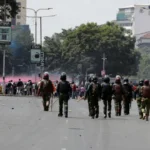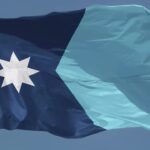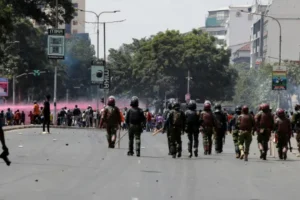In recent years, the Western Balkans have received millions in EU funding to strengthen their borders as a condition for their desired EU membership. On the ground, this reinforcement translates into police violence and hot returns
The sun sets over the train tracks that take you out of Šid, a municipality in western Serbia. As the sun sets behind these metal lines, dozens of kids take advantage of the light of what is known as the “golden hour” to take photos that will soon be edited with music in the background and uploaded to TikTok, while social workers call them to enter the camp: they have to sign in. These young people, all of them minors, rest in a transit camp for minors in this town. Checking in means scanning the cards they are given when they arrive, so the camps can keep track of who arrives. They all come in saying goodbye to us: “See you tomorrow” they shout in what little English they know. “Manana” is heard at the end and we respond with the same word. Manana means “thank you” in Pashto, the majority language of Afghanistan. Most of the young people who pass through Family Camp, as this transit camp is known, have come to Serbia to escape the Taliban regime.
We, for our part, are a group of volunteers with No Name Kitchen (NNK), a NGO present along the Balkan route, as well as in Italy and Ceuta, which is responsible for guaranteeing the rights of people on the move along the route. When we go to the camps, we try to cover the basic needs that the young people themselves demand. Be it a shower, food, or clothes that have been lost – or taken away from them – along the way. Although often a ball to play volleyball or a pack of cards to play bazaar – a typical Afghan game – are even more important. The NNK volunteers know that giving them back the dignity and childhood that the borders have taken away is often the most important thing.

Police violence along the Balkan route, and especially along the borders of the European Union, is something that No Name Kitchen, as well as other organisations in the region such as Collettivo Rotte Balcaniche or Colective Aid, among others, have been denouncing for years. Philippine Vaganay is a member of NNK and has been part of the Šid team for months, the young woman who was in charge of denouncing the violence of the EU borders denounces how “there are many cases of extreme humiliation by the police, who even send people back to the other side of the border without any clothes on”. Among the reports collected by the NGO in this western Serbian town, testimonies denouncing the violence of the Bulgarian police stand out.
The Turkish-Bulgarian border has become one of the most dangerous crossing points for these people. This is reported by “The Border Monitoring Network” (BVMN), one of the few platforms which few platforms that reports on the violence that people on the move suffer at borders. According to its September report, “in 2022 and 2023, with the rapidly deteriorating situation on the land border between Greece and Turkey, transit through Bulgaria increased dramatically. This was reflected in an increase in violent practices at the border, in particular expulsions and other rights violations”. In 2021, BVMN activated its presence in Turkey and started reporting testimonies of hot returns from Bulgaria. Since then, the platform has recorded “a total of 73 incidents of hot returns from Bulgaria involving 1,661 persons”. The continuous increase of violence and human rights violations at the Turkish-Bulgarian border is something that Vaganay has been witnessing for months, “the violence of the Bulgarian police has been recorded by us many, many times”. And this is reflected in the latest reports published by the organisation.
The externalisation of borders through the outsourcing of millions of dollars to third countries has become one of the main features of European migration policy. This, coupled with the ever-increasing presence of Frontex at these borders, has become a defining feature of the EU. In this regard, in December 2022, the European Commission presented the EU Action Plan for the Western Balkans, which defines a series of measures including “migration-related actions for a total amount of 201.7 million euros”. In addition, this plan allows “Frontex staff to exercise executive powers, such as border controls and searches of persons”. This translates into police abuse, violation of human rights, hot returns and physical and verbal violence at the hands of the security forces, whether border police or Frontex.
But with more people choosing to cross the Turkish-Bulgarian border, the President of the European Commission, Ursula von der Leyen, wrote a letter declaring the EU’s intention to further reform its borders, if at all possible. In the words of the Commission President, “in the Western Balkans, Frontex has started to deploy its border guards in Serbia, which already has 130 permanent forces deployed on its borders with Hungary and Bulgaria. Serbia recently confirmed its commitment to swiftly start negotiations on a new status agreement allowing for the deployment of permanent bodies also between the borders of the Western Balkan partners”. And the EU does not hesitate to use the Western Balkan countries’ desire for membership to add the reinforcement of their borders as entry requirements. “Negotiations with Montenegro and Albania on status agreements allowing for joint deployments and patrols have taken a decisive step,” Von der Leyen acknowledges in the same letter.
A blackmail that has been reinforced by “a new border protection assistance package for the Western Balkans, equipped with modernised equipment and endowed with 40 million euros”, in order to complete the “deployment of Frontex border guards and joint patrols to support border management in the Western Balkans through the conclusion of new status agreements with Albania, Montenegro, Serbia and Bosnia and Herzegovina”, measures that should be complemented by “specific support from Frontex and member states on return”.
All these measures and the millions of dollars allocated to border control, which the European Union has so carefully studied, translate on the ground into police violence, violation of human rights and hot returns. The institutional language and euphemisms that European leaders insist on repeating, seasoned with cynical promises of solidarity, do not erase the reality on the ground.
Osman (name changed for the safety of the source) and his brother have suffered the violence that results from the millions of euros that the EU allocates to control the Turkish-Bulgarian border. Farmaz and his brothers managed to reach Šid from Afghanistan. Osman tells in no uncertain terms what he experienced two days after crossing the Turkish-Bulgarian border, “they forced us to take off our clothes and burned them in front of us. They stole the money we were carrying; my brother and I had two hundred euros that they forced us to give them”. As he tells me this, his brother, barely ten years old, stands next to him and gestures at how the police forced them to lie on the ground and then, as he describes with gestures, beat them with batons. “They put us in cars and sent us back to Turkey”, the older brother tells me.

I met both brothers in June, while they were at Family Camp. Osman loves football and as soon as he heard that many of us volunteers were Spanish, he didn’t hesitate to point out that he knew who Roberto Carlos was. From then on, the football was never far from the doors of Family Camp. However, Osman has always made it clear that what he really likes are motorbikes and that when he arrives in Germany he will start studying mechanical engineering. His little brother, on the other hand, was not sure what he wanted to study “when he grew up”, but he told us that he was very fond of languages; at the age of ten he could already speak Pashto, Farsi and Turkish, and he had a fairly good command of English, but since they wanted to go to Germany, he hoped to study English there.
I ask, astonished, how he learned so many languages at such a young age. Osman tells me that “when we fled Afghanistan, we spent a year in a refugee camp in Iran, where Farsi was spoken. After that, we came to Turkey and spent two years working in factories in Istanbul”. Neither of the two brothers chose to speak these languages, they had to learn them the hard way. In Turkey, they told me, they saved what they could to be able to afford the “game” – as the Balkan route is known – to get to where we are now. Their last savings were those 200 euros that the Bulgarian police took from them. Unfortunately, the story of these two brothers is not special. Since 2015, the walls of this transit camp for minors have been covered with hundreds of stories like theirs.

Both brothers were in Family Camp for a little more than a week, and one day Osman confessed that he was actually nineteen years old, but that he lied because otherwise he would be separated from his brother. Thanks to this confession, we learned that minors were separated from their families when they arrived in Serbia. All those who arrive in Šid can be sent to three transit camps: Family Camp, Principovac and Adaševci. Now, all minors who arrive are sent to Family and adults to either of the other two. No matter if they are family, minors are always separated from the adults they travel with. No distinction is made. NNK denounced this fact as soon as they found out about it, but to no avail. Osman was forced to lie to avoid being separated from his ten-year-old brother.

For as much as the Serbian government is keen to ensure that conditions in camps across the country meet the basic needs of those arriving, organisations on the ground keep claiming that this is not the case. Adaševci, as reported by the Serbian Government’s Commission for Refugees, housed 715 people in 2019, but according to testimonies of people who have been forced to sleep there, it now accommodates more than 1,000.
Adaševci is located 28 kilometres from the city, in the middle of a motorway; it can only be reached by car, which isolates all the people who are sent to this camp. When the volunteers arrive at the camp, dozens of people come out to talk to us. Often, the social workers of the camp also show up to make sure that we do not perform any medical services.
NGOs on the ground, with the exception of Médecins Sans Frontières, are strictly forbidden to provide any medical care. Megan Stark is NNK’s health project manager in Šid, who is not even allowed to work at the gates of the camps in Šid because of an express prohibition by camp staff. “The people I talk to in the camps have no access to any medical services. Even those with visible injuries are not allowed to visit the health centre. If they want to, they have to go on their own”. Stark explains that “even people suffering from serious diseases such as scabies are often unwilling to go to the doctor, because of the deep mistrust of the doctor, because of a deep mistrust of the authorities as a result of what they have been through on the road”. Not infrequently, social workers themselves call the police to throw out NGO volunteers in any of the cities where they have a presence.
This situation of violation of rights is not only experienced in Šid; Subotica on the border with Hungary, or Pirot on the border with Bulgaria or even Belgrade are other places where organisations such as No Name Kitchen, Collettivo Rotte Balcaniche or Médecins Sans Frontières try to reach as many people as possible with the resources they have. Amnesty International already reported in 2019 on “human rights violations committed against refugees and migrants along the Western Balkan route”. In this report, the organisation noted “widespread collective expulsions – often accompanied by violence – and systematic denial of access to asylum”.

During the last few months in Šid, most of the arrivals were from Afghanistan, and every farewell ended with a “Manana”. When the sun had gone down, the NNK volunteers finished their day. As they drove along the train tracks connecting Serbia with Croatia in the direction of Serbia, they knew that dozens of people, in a few hours’ time, would take the opposite route.
A façade full of racist graffiti written by “Chetnik groups”, as they put it, welcomes them. The local community is not happy with the work the NGOs are doing either, attacks on houses, cars and the equipment they work with are normal, and the volunteers know it. Even so, all of them are already preparing the clothes, food and showers that dozens of people have asked for the next day.

There are times, far fewer than we would like, when good news arrives on the Balkan route. Three weeks after saying goodbye to Osman and his brother, and after days without hearing from them, they contacted us from Germany: they had arrived and were expecting to receive accommodation shortly. A few days ago I wrote to Osman again to find out how things were going: they were both staying in the same centre and had started studying.
Source : Atalayar











